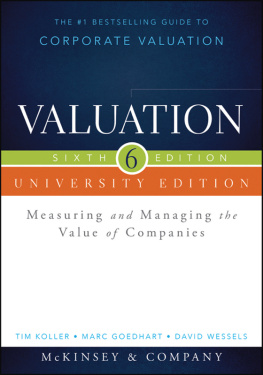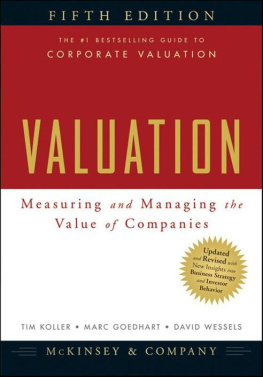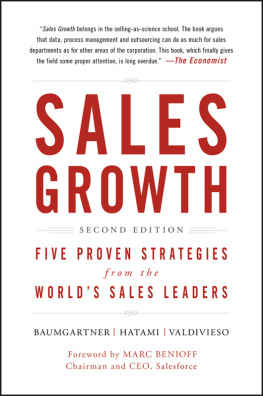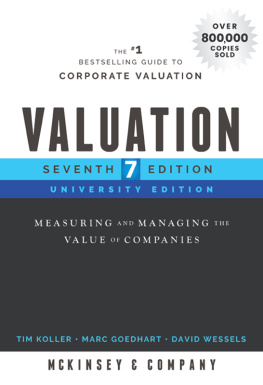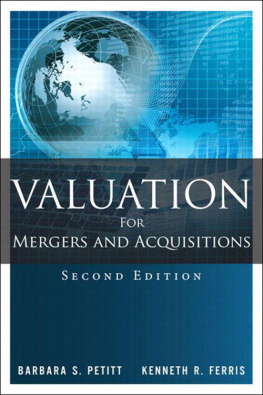
The Wiley Finance series contains books written specifically for finance and investment professionals as well as sophisticated individual investors and their financial advisors. Book topics range from portfolio management to e-commerce, risk management, financial engineering, valuation and financial instrument analysis, as well as much more. For a list of available titles, visit our Web site at www.WileyFinance.com.
Founded in 1807, John Wiley & Sons is the oldest independent publishing company in the United States. With offices in North America, Europe, Australia and Asia, Wiley is globally committed to developing and marketing print and electronic products and services for our customers' professional and personal knowledge and understanding.
Cover image: iStock.com/alzajac
Cover design: Wiley
Copyright 1990, 1994, 2000, 2005, 2010, 2015 by McKinsey & Company. All rights reserved.
Published by John Wiley & Sons, Inc., Hoboken, New Jersey.
Published simultaneously in Canada.
No part of this publication may be reproduced, stored in a retrieval system, or transmitted in any form or by any means, electronic, mechanical, photocopying, recording, scanning, or otherwise, except as permitted under Section 107 or 108 of the 1976 United States Copyright Act, without either the prior written permission of the Publisher, or authorization through payment of the appropriate per-copy fee to the Copyright Clearance Center, Inc., 222 Rosewood Drive, Danvers, MA 01923, (978) 750-8400, fax (978) 646-8600, or on the Web at www.copyright.com. Requests to the Publisher for permission should be addressed to the Permissions Department, John Wiley & Sons, Inc., 111 River Street, Hoboken, NJ 07030, (201) 748-6011, fax (201) 748-6008, or online at www.wiley.com//permissions.
Limit of Liability/Disclaimer of Warranty: While the publisher and author have used their best efforts in preparing this book, they make no representations or warranties with respect to the accuracy or completeness of the contents of this book and specifically disclaim any implied warranties of merchantability or fitness for a particular purpose. No warranty may be created or extended by sales representatives or written sales materials. The advice and strategies contained herein may not be suitable for your situation. You should consult with a professional where appropriate. Neither the publisher nor author shall be liable for any loss of profit or any other commercial damages, including but not limited to special, incidental, consequential, or other damages.
For general information on our other products and services or for technical support, please contact our Customer Care Department within the United States at (800) 762-2974, outside the United States at (317) 572-3993 or fax (317) 572-4002.
Wiley publishes in a variety of print and electronic formats and by print-on-demand. Some material included with standard print versions of this book may not be included in e-books or in print-on-demand. If this book refers to media such as a CD or DVD that is not included in the version you purchased, you may download this material at http://booksupport.wiley.com. For more information about Wiley products, visit www.wiley.com.
Cloth edition: ISBN 978-1-118-87370-0
Cloth edition with DCF Model Download: ISBN 978-1-118-87368-7
University edition: ISBN 978-1-118-87373-1
Workbook: ISBN 978-1-118-87387-8
DCF Model Download: ISBN 978-1-118-87366-3
About the Authors
The authors are all current or former consultants of McKinsey & Company's corporate-finance practice. Collectively they have more than 70 years of experience in consulting and financial education.
Tim Koller is a partner in McKinsey's New York office, where he leads a global team of corporate-finance expert consultants. In his 30 years in consulting, Tim has served clients globally on corporate strategy and capital markets, mergers and acquisitions (M&A) transactions, and value-based management. He leads the firm's research activities in valuation and capital markets. Before joining McKinsey, he worked with Stern Stewart & Company and with Mobil Corporation. He received his MBA from the University of Chicago.
Marc Goedhart is a senior expert in McKinsey's Amsterdam office and leads the firm's Corporate Performance Center in Europe. Over the past 20 years, Marc has served clients across Europe on portfolio restructuring, capital markets, and M&A transactions. He taught finance as an assistant professor at Erasmus University in Rotterdam, where he also earned a PhD in finance.
David Wessels is an adjunct professor of finance at the Wharton School of the University of Pennsylvania. Named by Bloomberg Businessweek as one of America's top business school instructors, he teaches courses on corporate valuation and private equity at the MBA and executive MBA levels. David is also a director in Wharton's executive education group, serving on the executive development faculties of several Fortune 500 companies. A former consultant with McKinsey, he received his PhD from the University of California at Los Angeles.
McKinsey & Company is a global management-consulting firm that serves leading businesses, governments, nongovernmental organizations, and not-for-profits across a wide range of industries and functions, helping them make distinctive, lasting, and substantial improvements in performance and realize their most important goals. McKinsey consultants serve clients in every region from a network of over 100 offices in more than 60 countries, advising on topics including strategy, finance, operations, organization, technology, marketing and sales, risk, and sustainability and resource productivity.
Preface
The first edition of this book appeared in 1990, and we are encouraged that it continues to attract readers around the world. We believe the book appeals to readers everywhere because the approach it advocates is grounded in universal economic principles. While we continue to improve, update, and expand the text as our experience grows and as business and finance continue to evolve, those universal principles do not change.
The 25 years since that first edition have been a remarkable period in business history, and managers and investors continue to face opportunities and challenges emerging from it. The events of the economic crisis that began in 2007, as well as the Internet boom and its fallout almost a decade earlier, have strengthened our conviction that the core principles of value creation are general economic rules that continue to apply in all market circumstances. Thus, the extraordinarily high anticipated profits represented by stock prices during the Internet bubble never materialized, because there was no new economy. Similarly, the extraordinarily high profits seen in the financial sector for the two years preceding the start of the 20072009 financial crisis were overstated, as subsequent losses demonstrated. The laws of competition should have alerted investors that those extraordinary profits couldn't last and might not be real.
Over time we have also seen confirmed that for some companies, some of the time, the stock market may not be a reliable indicator of value. Knowing that value signals from the stock market may occasionally be unreliable makes us even more certain that managers need at all times to understand the underlying, intrinsic value of their company and how it can create more value. In our view, clear thinking about valuation and skill in using valuation to guide business decisions are prerequisites for company success.
Today, after six years of sluggish recovery in the United States and stagnation in Europe, calls mount for changes in the nature of shareholder capitalism. We find that the blame for a poorly performing economy should not be placed on the pursuit of shareholder value creation, but on a misguided focus on short-term performance that is inconsistent with the value-creation principles we describe in this book. Creating value for shareholders does not mean pumping up today's share price. It means creating value for the collective of current and future shareholders by applying the techniques explained in this book.
Next page
